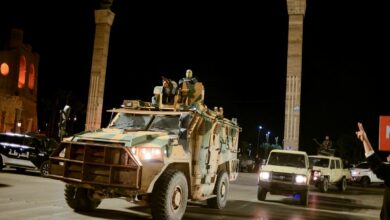As the countdown for presidential elections races on, uncertainty continues to mar Egypt's transitional path since the new president may be sworn in before a permanent constitution laying out his authorities is ratified.
According to the plan backed by two key political players, the Muslim Brotherhood and the Supreme Council of the Armed Forces, Parliament will first elect a 100-member constituent assembly to draft the constitution, then the new constitution will be put to a public referendum and finally the president will take office. Islamists have defended this order over the course of the transition, arguing that no president should be elected without knowing his exact powers.
However, this scenario may not hold given time constraints. On 23 and 24 May, Egyptians are expected to vote on the next president. Given the large number of candidates, a run-off is set to take place on 16 and 17 June and the final results are to be announced on 21 June. The SCAF had earlier declared that the transitional period would end by 30 June, implying that the military would relinquish power and hand over the helm of state to the newly-elected president by that date.
However, Parliament has yet to elect the constituent assembly and with less than three months before the new president is slated to be announced, some legal experts hold there is no way it could conclude the colossal mission of drafting the post-revolution constitution in such a short period.
"Of course, passing a constitution before the presidential elections is not a conceivable option," Ibrahim Darwish, constitutional law professor at Cairo University, told Egypt Independent. "You cannot just rush a constitution in one or two months."
But the Muslim Brotherhood's Freedom and Justice Party still believes the plan could go as scheduled. According to Hatem Abdel Azim, an FJP lawmaker, the constituent assembly will likely conclude its work before the late-June deadline.
"This is a high possibility because the points that need to be addressed in the new constitution are few," Abdel Azim told Egypt Independent, reiterating the party’s argument that the old constitution could be readopted with few amendments only to articles granting the president sweeping powers and clauses inherited from Gamal Abdel Nasser's socialist era.
"We want a fully parliamentary system but this cannot be achieved in one step. Hence, the reality requires the adoption of a mixed system where the president's powers are not absolute but balanced with those of the Parliament and the cabinet," added Abdel Azim, whose party holds more than 40 percent of Parliamentary seats and is expected to have a strong say on the makeup of the constituent assembly.
In the unlikely situation that the constitution's architects do not finish before 30 June, according to Abdel Azim, the new president shall rule according to the military-issued interim constitution, the Constitutional Declaration, which was approved by public referendum last March.
The new president shall assume all responsibilities assigned to the SCAF in the interim constitution until a permanent one is passed, Abdel Azim said.
This option could prove problematic as the 63-article declaration falls short of mapping out a detailed framework that would regulate the relationship between the president and the legislature, such as how a disagreement over a proposed bill should be resolved.
The interim constitution is seen as giving the SCAF, hence the president, sweeping powers including the right to make legislation, appoint or dissolve a cabinet, choose the appointed members of Parliament, ratify or veto laws, represent the state at home and abroad, and conclude treaties.
"A president cannot rule by virtue of the Constitutional Declaration," said Tahani al-Gebali, vice president of the Supreme Constitutional Court. "It is abridged and the authorities are not fully defined."
"It gives the Parliament no right to withdraw confidence from the government and in the meantime it does not give the president the right to dissolve the Parliament and call for early elections in case of any disagreement. This is important to have for the sake of ensuring a balance of power between the executive and the legislature," argued Gebali.
The unclear and incomplete nature of the Constitutional Declaration has been the cause of tension between lawmakers and the military-appointed cabinet in recent weeks. Citing different interpretations of the document, the FJP-dominated Parliament insists it has the right to move a no-confidence vote against the cabinet, ministers insist only the SCAF can fire them.
By the same token, a conflict may arise between the president and lawmakers over their respective jurisdictions if the Constitutional Declaration remains in effect. For Gebali, it would be better to reactivate the 1971 constitution, despite all its flaws, than let the president rule according to the interim constitution.
"At least, we would have a full-fledged constitution," she argued.
Abdel Azim downplayed these concerns, arguing the president will not rely on the Constitutional Declaration for long. He expects the constituent assembly, set to be elected on Saturday, will spend no more than three months drafting the constitution and will have it ready a week or two after the president is elected.
Nevertheless, the Islamist MP's confidence that the constitution will be ready soon aroused other fears for Gebali.
"This means they [Islamist parties] have already prepared a constitution and will impose it on us," she alleged.
"No constitution should be laid out hastily. We should spend enough time on a national dialogue in order to build a consensus around it … Otherwise, we will be setting a prelude for a second wave of the revolution."
The Islamist-secular tension is already brewing over the composition of the constituent assembly. Last week, the divide was deepened after Islamist parties insisted that the assembly should include 50 lawmakers, ignoring the secular minority's demands to allocate no more than 35 seats to MPs to ensure that other segments of society are well-represented. Secular legislators accused Islamists of seeking to monopolize the constitution writing.
Even if the constituent assembly drafts the constitution within the stipulated timeframe, it will be still hard to hold a judiciary-monitored public referendum at the same time as the presidential poll, Gebali holds, asking, “Are we going to clone judges?”
Nasser Amin, director of the Arab Center for the Independence of the Judiciary and the Legal Profession expressed similar concerns, saying that holding simultaneous or back-to-back votes would exhaust judges and threaten the integrity of the process.
"Voters will be exhausted too and this will lead to a low turnout," he added.
The controversy surrounding the conclusion of the constitution is not the final or only hurdle remaining in the transition to a civilian government.
The incumbent Parliament might be declared illegitimate if the Supreme Constitutional Court rules in favor of an appeal contesting the legality of parliamentary elections. It is being contested that the allocation of two-thirds of seats to party lists and one-third to individual candidates may violate the principle of equal opportunity. Judicial sources have told a local paper that the case may stretch into October.
If the claim is upheld, Parliament may be dissolved. Some legal experts argue that in this situation the legitimacy of the constitution-writing process could be undermined in retrospect, since the assembly would be seen as chosen by illegitimately-elected lawmakers.
"Nonsense" is how Atef al-Banna, a member of the military-appointed commission that designed the transitional plan in February 2011, dismissed these claims.
"The nullification of the Parliament will not imply the nullification of its decisions."
Banna referred to two well-known instances when constitutional courts declared the People's Assembly illegitimate in 1987 and 1990. In both cases, the Parliament was dissolved but its decisions were not invalidated by the court, according to Banna.
Even if the constitutional case does not shake the legitimacy of the constituent assembly, dissolving Parliament would exacerbate political instability.
Many experts blame this mayhem on the SCAF-controlled transition and the stipulation that Parliament must elect the constituent assembly, arguing that the public should have first elected the assembly to write the constitution before returning to the polls to choose lawmakers and a president.




